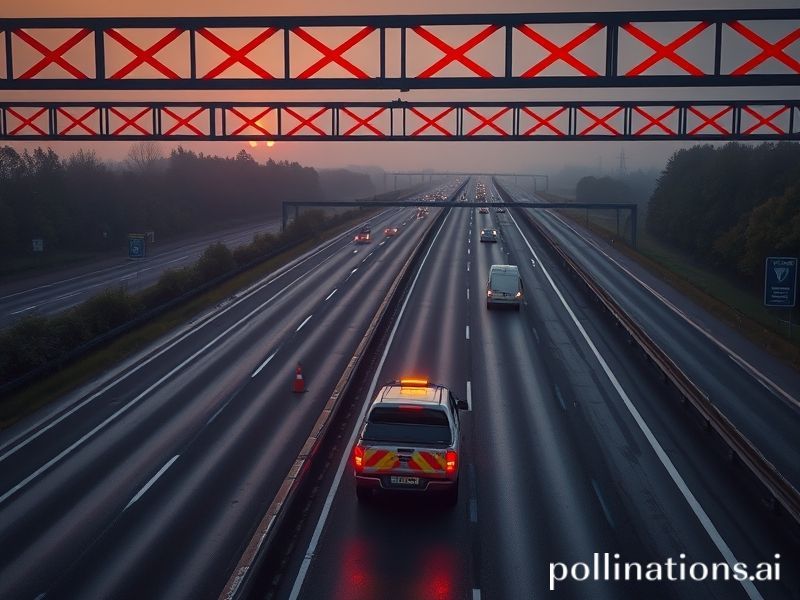M25 Closures: How Britain’s Circular Nightmare Became the World’s Traffic Circus
**The M25: Humanity’s Latest Attempt at Circular Self-Destruction**
While the world’s superpowers engage in their favorite pastime of measuring nuclear capabilities and the planet politely requests we stop setting it on fire, Britain has orchestrated its own unique contribution to global chaos: turning the M25 into the world’s largest, most expensive parking lot. Again.
The London Orbital Motorway—that 117-mile concrete necklace around Britain’s capital—has entered its latest scheduled period of existential crisis. For international readers unfamiliar with this peculiar British ritual, imagine if the ancient Romans had built the Colosseum specifically for the entertainment of watching people slowly lose their minds in traffic. That’s essentially what we’ve created here, except with more Costa Coffee cups and existential dread.
From Beijing to Buenos Aires, traffic engineers are watching this spectacle with the morbid fascination usually reserved for slow-motion train wrecks or American political conventions. The M25 closure isn’t merely a local inconvenience; it’s a masterclass in how supposedly advanced nations can transform basic infrastructure maintenance into a form of performance art that would make even the most pretentious installation artist blush.
Consider the global implications: while China builds entire cities in the time it takes a British commuter to travel 30 miles, the UK has perfected the art of turning a simple ring road into a metaphor for post-imperial decline. It’s rather like watching a former heavyweight champion struggle to open a jar of pickles—humbling, slightly tragic, yet weirdly compelling.
The economic ripple effects spread faster than gossip at a small-town hairdresser’s. Supply chains across Europe—already held together with the logistical equivalent of duct tape and wishful thinking—now face additional delays because Dave from Kent can’t get his lorry past Junction 9. International businesses must factor “British motorway maintenance” into their risk assessments, alongside “volcanic eruption” and “political instability,” though arguably the motorway poses more frequent disruptions.
Meanwhile, in developing nations where basic road infrastructure remains aspirational, engineers observe this British spectacle with mixed emotions. On one hand, there’s admiration for a nation wealthy enough to have motorways requiring maintenance. On the other, there’s bewilderment at how such a simple concept—building a road that actually functions—has eluded one of the world’s oldest democracies.
The environmental implications deserve special mention. Thousands of vehicles idling in congestion, their drivers contemplating whether civilization was such a brilliant idea after all, pump emissions into an atmosphere that’s already had quite enough of our shenanigans. It’s almost as if we’ve invented a new form of carbon offset: destroying the planet while pretending to fix it.
But perhaps the M25’s greatest achievement is its unifying quality. In an increasingly polarized world, it brings together people of all backgrounds, races, and political persuasions in shared misery. Brexit Leavers and Remainers finally agree on something: this traffic is absolutely atrocious. It’s the British version of a kumbaya moment, just with more creative swearing and questionable sandwich choices from service stations.
As the closures continue and commuters develop increasingly elaborate conspiracy theories about why their satnav seems personally offended by them, the world watches and learns. Some lessons are practical: don’t build critical infrastructure in a circle. Others are philosophical: perhaps the journey really is more important than the destination, especially when the journey takes six hours and the destination is simply “home.”
The M25 stands as a monument to human optimism—the kind that believes if we just add one more lane, surely that will fix everything. It’s infrastructure as metaphor, a circular testament to our species’ ability to complicate the simple and turn necessity into nightmare.
In the grand tapestry of human achievement, the M25 closures represent something profound: proof that regardless of nationality, culture, or creed, we all share the capacity to spectacularly misunderstand how roads work.







